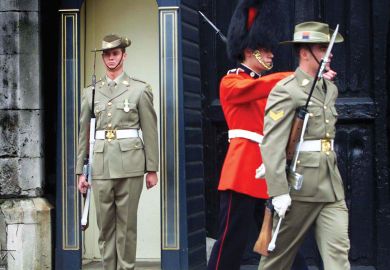The pandemic changed higher education forever. That might be a strong statement, but, as someone who has been involved with more than 120 campus strategic planning processes over the past 30 years, I believe that it is true.
There wasn’t a road map on how to manage the online transition last spring. There were quite a few leaders who tried to bluff their way through with “positivity” and optimism, and others who were arrogant, convinced they were right about every strategic decision they were making. Both were humbled by the adaptive challenges thrown up.
They – indeed, all university leaders – need to learn the lessons of the Covid experience quickly and diligently, so that they can be applied to the complex challenges that face us in the future.
Each campus should conduct a series of “after action reviews” (AARs) of the strategic decisions that were made during the Covid crisis to reflect on what worked and what didn’t. Both success and failure offer important lessons that, shared across campus (and, ideally across the country and beyond), can make everyone smarter.
AARs have been around for decades and have been institutionalised by the US army. Yet although they have a simple structure, consisting of just four or five questions, they are challenging to implement. It will take real courage, in particular, to unpack the failures of leaders over the past year. A ton of research needs to be absorbed so that reviews are conducted honestly and empathetically.
One issue to reflect on is consensus. Many leaders claim to be leading by consensus, but what does that actually mean on your campus – and when is it appropriate? Having a consensus mentality is a noble aspiration, but it can also be used as a weapon to control and stall important decisions. Campuses need to agree upon a clear definition of what consensus does and doesn’t mean – and when it is and is not appropriate. It can’t be used for everything – especially when rapid decisions are demanded.
Similarly, it is important that faculty and staff understand who decides what and the level of influence that different people have on institutional decisions. When the rules are fuzzy, implementation falters because people are unsure how much freedom they have to take action. The board and senior leadership team all need to get on the same page about how they will make decisions regarding planning and implementation, and they must communicate this to everyone on campus.
We also need to become more efficient. We somehow assume that campus leaders know how to design and facilitate a productive meeting, for instance. Unfortunately, most do not. They need training. Given how many meetings we conduct, this would be transformative; the opportunity costs regained would be priceless.
Meetings proliferate in pursuit of perfect decisions. Most people, especially faculty, have high standards and expectations. But, often, the search for the perfect plan or solution costs way too much time, attention and money. We need to get better at approaches and solutions that can be enhanced over time and, more importantly, change quickly in an unpredictable environment.
We should also reflect on who the real campus heroes and heroines are. We tend to recognise and reward the big-picture thinkers: the “visionaries”. I have found these people to be a dime a dozen. We need instead to identify and celebrate the crucial but often underappreciated people who actually get things done. I believe that a monthly “implementation champion” or “doer” award would be a game-changer for campus culture, creating the kind of implementation mentality we desperately need as challenges mount.
For my money, the relational capital between campus stakeholder groups is the key factor in accomplishing things. The question a lot of leaders have is, “How do you build authentic relationship capital without being off-putting?”
I suggest using a design called “tell me a story”. Let’s say we have 60 people, drawn from among staff and students. I organise them into mixed groups of six participants each and ask each person to share a story in their small groups that captures the essence of their campus culture at its best.
This could about be a time when a faculty member went out of their way to support a struggling student. It could be when student affairs folks created a weekly support group to help some students who were struggling with a mental illness. It could be when the campus foundation created a “last mile” tuition programme for students who were struggling financially. You get the idea. There are hundreds of these kinds of positive stories on every campus. The problem is that we rarely share and elevate them.
Once participants have all shared their stories, I ask the groups to identify the one story that captures the essence of all the other stories and share it with the larger group. This all takes less than an hour and is best conducted with a little food and refreshments. I call them “chews and chats,” and they are invaluable in building relationships between different campus tribes.
Such exercises could be especially valuable now. As campuses face an uncertain future, it will do their inhabitants the world of good to be reminded that higher education has been exceptionally resilient this past year. Whatever failures we may have had, let’s not forget that, overall, we did very well.
Patrick Sanaghan is an organisational consultant and president of The Sanaghan Group. His latest book is How To Implement Your Campus Strategic Plan.
Register to continue
Why register?
- Registration is free and only takes a moment
- Once registered, you can read 3 articles a month
- Sign up for our newsletter
Subscribe
Or subscribe for unlimited access to:
- Unlimited access to news, views, insights & reviews
- Digital editions
- Digital access to THE’s university and college rankings analysis
Already registered or a current subscriber?








